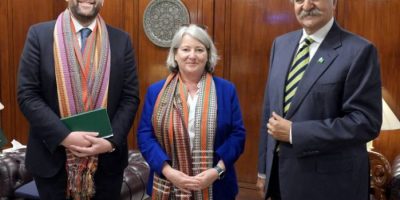Australian envoy stresses need for women empowerment

ISLAMABAD, JUNE 27 (DNA) -Margaret Adamson the High Commissioner of Australia has said gender equality is a central element of Australian Foreign Policy and the Australian Foreign Service seeks to reflect through its personnel Australia’s diverse society as well as to demonstrate its commitment to gender equality.
The Australian Government’s Women in Leadership Strategy, announced in 2014, is ensuring all public servants have the opportunity to reach their full potential, including in the Foreign Service.
Australia is also committed to orienting its development assistance programs towards equality for women. We have done so in the conviction that by empowering women, the world can be changed for the better.
She expressed these views in a media interview.
The Australian High Commissioner further said, it is a privilege to serve one’s nation at any point of a Foreign Service career, and the role of Ambassador brings particular responsibilities as the overall representative.
“Our work varies widely, from bilateral or international negotiations advocating Australian policies and positions, advancing our development cooperation partnerships, engaging with survivors of humanitarian disasters, to promoting Australian exports and investment”.
To a question about women empowerment the high commissioner said, women make up 50 per cent of the world’s population. Without their contribution, there can be no hope for sustainable economic development at the domestic, national or global level.
Women’s contribution is vital not just in terms of the work force, but also in innovation, as women are by no means less innovative than men, as a glance at the Nobel Prize website or investigation of women’s involvement in the creative arts quickly demonstrates. But women’s empowerment is also about fairness and equality for all human beings: it is a matter of human rights and the successful functioning of our societies in terms of leadership and the rule of law.
Women in power can play a significant role in advocating for women’s empowerment and demonstrating their success and contributions to outcomes historically expected of men.
But we also need men to step up beside women in building a gender-equal world, especially given the fact that men continue to hold most of the levers of power and influence in our societies. In Australia there is a movement, Male Champions of Change, bringing together company CEOs and other men in key roles, such as the Head of Army and Chief Police Commissioner.
I believe men and women at all levels can use their individual and collective leadership to elevate gender equality as an issue of national and international social and economic importance. Men as well as women also need to stand up for an end to gender-based violence which persists in all of our countries. Australia has invested $A8.65 million in Pakistan to support Pakistan’s efforts to combat gender-based violence including through implementation of policy and legislation and by promoting safe cities.
She added, Australia was swift to recognise Pakistan as an independent and sovereign state and opened its first High Commission in Karachi in 1948. Our countries enjoy open and friendly, mutually respectful relations, based on our shared Commonwealth heritage and, of course, our common passion for cricket! The Pakistani diaspora living in Australia makes a strong contribution to Australia’s multicultural society.
“We welcome a large body of more than 12,000 Pakistani students enrolled in Australian universities and have active network of alumni, many of whom are working in positions of influence across Pakistan. Our scholarship program has been sending Pakistani scholars to Australia since the 1950’s”.
She said, Australia supports the people of Pakistan through our broader development assistance partnership, prioritising inclusive, sustainable economic growth, national stability and gender equity. There is continuing growth at the people-to-people, cultural and trade levels. The value of two-way trade in goods and services is approaching $A2 billion.
Toa question she said, “I am focused on building upon the shared interests of our two governments, our bilateral links and cooperation. These are wide-ranging and include promoting regional peace, stability and economic prosperity, combating terrorism and extremism, fostering commerce and supporting Pakistan to address development challenges in education, nutrition, and sustainable agriculture and water management”.
Our two countries have been elected to the United Nations Human Rights Council for the 2018-2020 term and I look forward to working with Pakistan in support of human rights globally during our Council term and beyond.
Pakistan she said is a wonderful country, inhabited by extremely hospitable and generous people. I admire the richness and diversity of Pakistani culture, which stems from South Asia’s remarkable history.=DNA
==================
Related News

Irish envoys meet Syed Naveed Qamar to strengthen ties
ISLAMABAD, JUL 15 /DNA/ – The Ambassador of Ireland to Pakistan, Mary O’Neill, along withRead More

UK introduces eVisas for Pakistani and skilled workers
Most main applicants travelling to the UK on study or work-related visas will no longerRead More


Comments are Closed